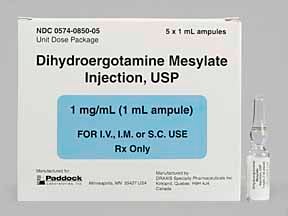
My prescription
Edit
1ML of 1MG/ML, Dihydroergotamine (1 Ampule)
Select pharmacy

CVS
$56.05
COUPON PRICE
Albertsons
$30.18
COUPON PRICE
Walgreens
$44.13
COUPON PRICE
Walmart
$67.21
COUPON PRICEDihydroergotamine savings card
Show this card to your pharmacist
Albertsons
$30.18
BIN
ID
PCN
GRP
019876
LHB855AEBF
CHIPPO
LHX
Powered by
More prescriptions for migraine
More prescriptions for migraine
Price history for Migranal (brand) & Dihydroergotamine (generic)
1 Ampule, 1ML
Average retail price for Migranal
Average retail price for Dihydroergotamine
Average SaveHealth price for Dihydroergotamine
Our price history data is based on aggregated prescription data collected from participating pharmacies in America. Our prescription data updates daily to reflect the latest price changes. If you notice a missing data point, it means there wasn't sufficient data available to generate a monetary value for that date.
We analyzed Dihydroergotamine prices for (1ML, 1 Ampule) over the last 12 months. The average retail price was $132.30, while the average price using the SaveHealth discount card was $66.80. That's a savings of approximately 49.51% when using our Dihydroergotamine coupon.
Compared to the generic version, Migranal had an average price of $573.15 over the same time period. With the SaveHealth savings card, Dihydroergotamine is 88.35% cheaper on average than Migranal.
*Retail prices are based on pharmacy claims data, and may not be accurate when we don't have enough claims.
Dihydroergotamine dosage forms
Dosage Quantity Price from Per unit 1ML 1 Ampule $30.18 $30.18 1ML 2 Ampules $52.86 $26.43 1ML 3 Ampules $75.54 $25.18
| Dosage | Quantity | Price from | Per unit |
|---|---|---|---|
| 1ML | 1 Ampule | $30.18 | $30.18 |
| 1ML | 2 Ampules | $52.86 | $26.43 |
| 1ML | 3 Ampules | $75.54 | $25.18 |
